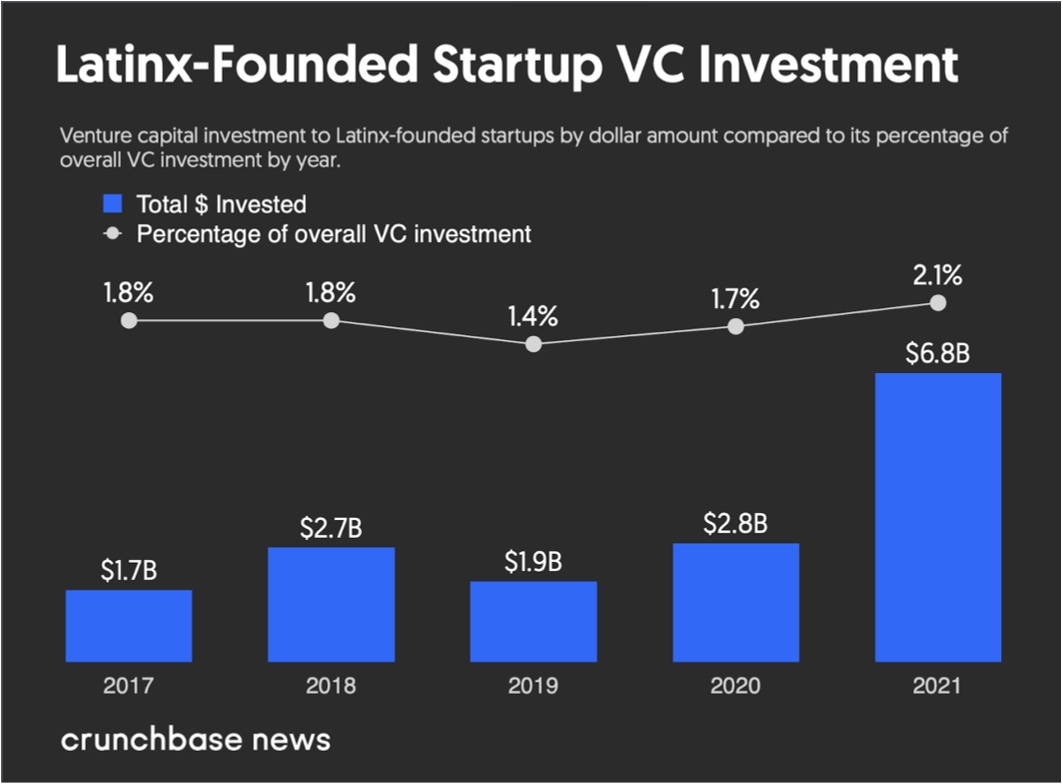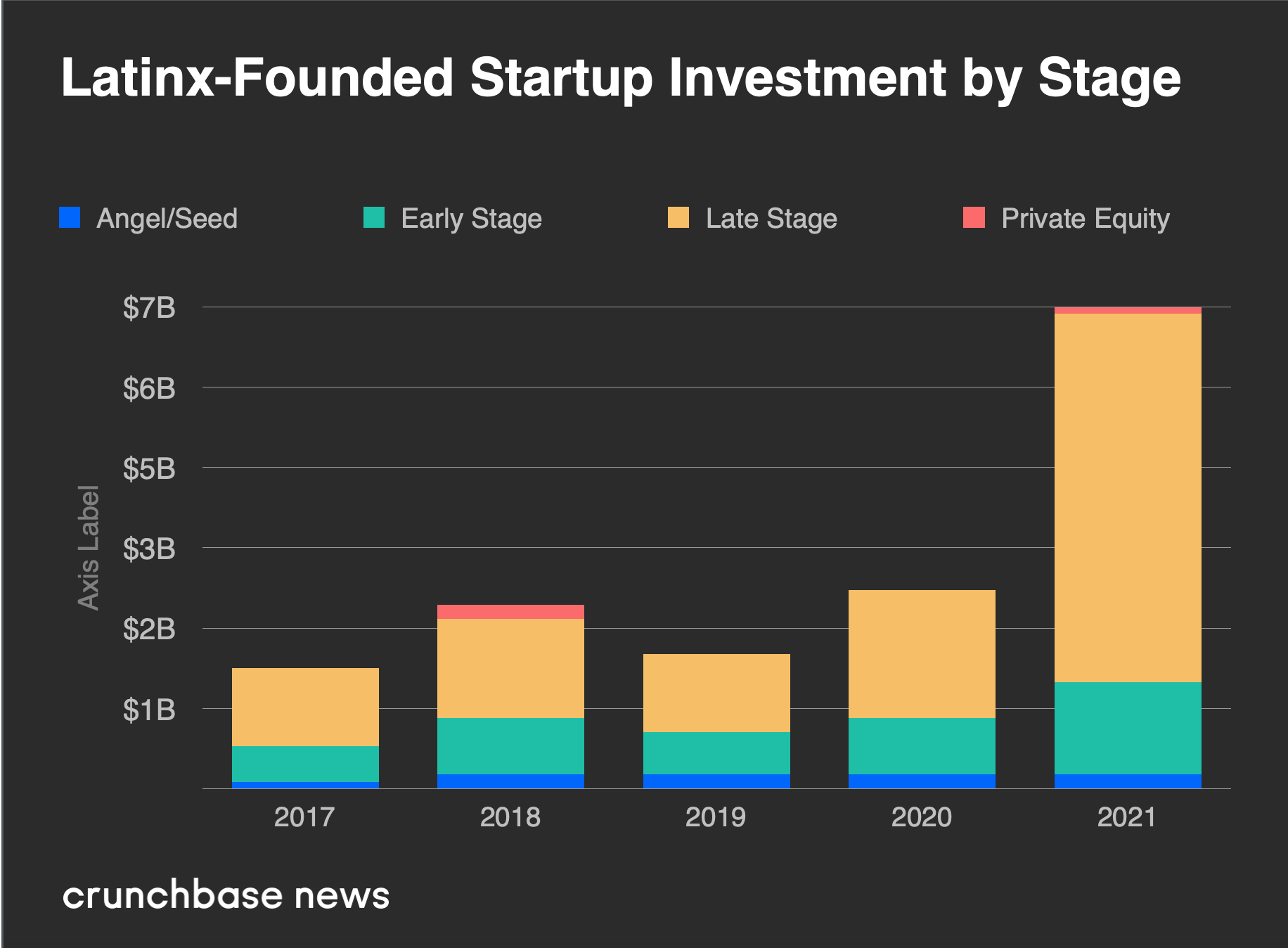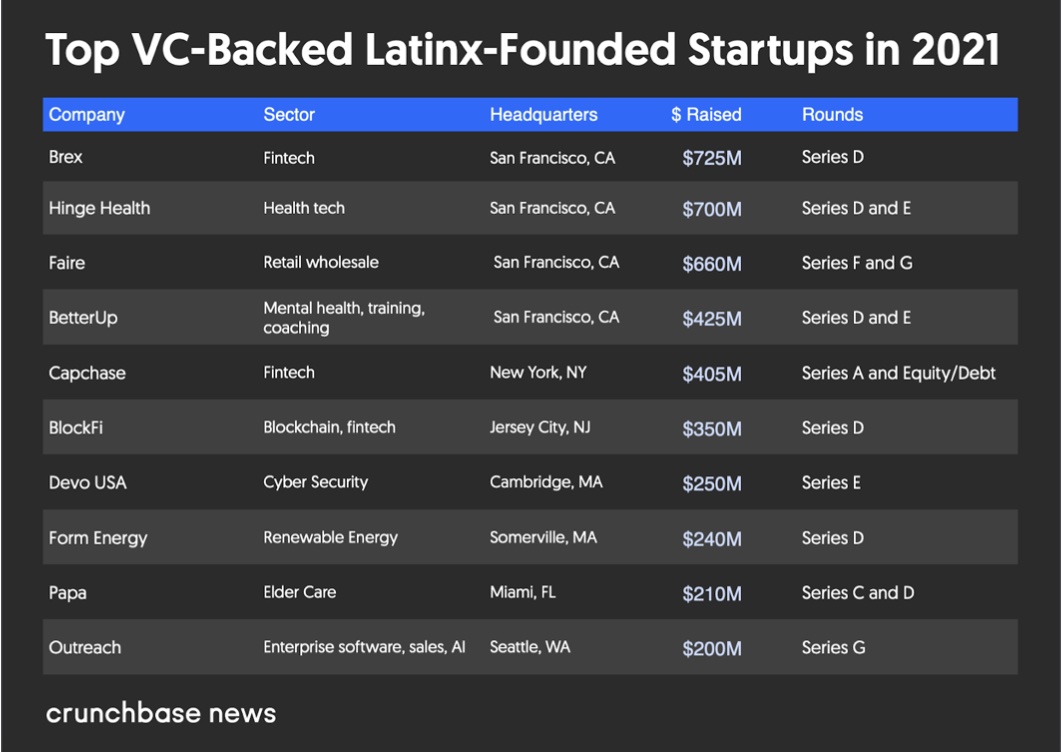Editor’s note: This article is part of Something Ventured, an ongoing series by Crunchbase News examining diversity and access to capital in the venture-backed startup ecosystem. Access the full project here.
Tai Adaya launched skin care startup HABIT in mid-2020 and within a year the company was profitable and viral on social media platform TikTok, feats that would make any startup founder proud. But as it turns out, critical venture capital funding—the kind of money that allows startups to scale and market—was harder to nail down than consumer buy-in.
Adaya is one of a large and growing cohort of Latine startup founders in the U.S. But Crunchbase data shows that while funding to Latinx founders has increased in dollar terms—from $1.7 billion in 2017 to $6.8 billion in 2021—that growth only slightly outpaced the overall increase in U.S. venture capital investments, leaving Latine startup funding stuck stubbornly at around 2 percent of the overall startup investment pie.
Meanwhile, the data shows early-stage funding, arguably the most critical phase, has stagnated almost completely in recent years.

The disparity makes little sense considering that the number of Latinx-founded businesses—and their profitability—is growing. Latine-founded businesses made up about half of the net new small business growth between 2007 and 2017, data from management consulting firm Bain & Co. shows.
Such companies are also a good investment, according to the Stanford Latino Entrepreneurship Initiative, which notes Latinx-founded companies often have high credit scores and fast-growing annual revenue compared to companies with white, non-Latinx founders.
Search less. Close more.
Grow your revenue with all-in-one prospecting solutions powered by the leader in private-company data.
Meanwhile, Latine-founded businesses are struggling not only to secure VC funding, but other types of investment as well. Even after controlling for revenue growth, industry, credit scores and profitability, Latine business owners are about 60 percent less likely to be approved for a loan from a national bank, according to Marlene Orozco, associate director for the Stanford Latino Entrepreneurship Initiative.
“We’ve done analysis that shows in order for a company to scale and grow, you need to have external sources of capital,” she told Crunchbase News. “Most Latino-owned businesses, what that means is that they need to be very resourceful, and they’re bootstrapping their companies.”
For Adaya and many Latine startup founders, the disparity between funding and outcomes is felt far beyond the bottom line.
“If you’re someone who looks like me and going after that type of financing, you end up just wasting a ton of time, and that, to me, is where it gets super, super costly,” she said. “If I were a white guy, I would probably talk to 50 people, but you end up talking to 1,000 people if you’re not a white guy to get to the same end result.”
Adaya noted that only about 2 percent of venture capital funds go to women-only founded businesses and that those numbers are even bleaker for women of color like her who launch a startup.
“There are a lot of egos in VC and there are a lot of people that are not really willing to listen,” Adaya said.
Search less. Close more.
Grow your revenue with all-in-one prospecting solutions powered by the leader in private-company data.
Early-stage funding stalls
One particularly crucial area where Latine funding is diverging from overall investment trends is in early-stage startups.
The dollar amount received in angel, pre-seed and seed rounds for venture-backed Latine-owned startups in the U.S. has barely budged since 2018, when $185 million went to Latine-owned companies raising those earliest rounds, Crunchbase data shows. In 2021, $205 million went to Latine startups raising angel, pre-seed and seed rounds, a mere $20 million increase from three years earlier.
Other early-stage funding has grown slightly from about $800 million in 2018 to $1.3 billion in 2021. That means almost all of the growth in funding that Latine founders have seen in recent years went primarily to later-stage startups.

The ripple effects
The slow pace of change in early-stage funding among Latinx founders is a problem with real consequences, said Michael Clouser, co-founder of The Startup Race, a hackathon and accelerator that aims to help founders across the globe.
The first, and most obvious, consequence is that when a startup is summarily passed over for investment at its earliest stages, its founders are less likely to get a chance to prove themselves through some amount of scaling, hiring or marketing, even when their idea is good.
“The issue is that you’ve got to have a really big base of companies and then let the Darwinistic process takeover,” said Clouser, who is based in Colombia. “But when you have fewer companies available for that Darwinistic process, eventually that equates to fewer unicorns.”
Lack of funding can also affect recruitment, Clouser added, because top talent may follow the money to their next job to reduce the risk that they’ll be back on the job hunt in short order.
Search less. Close more.
Grow your revenue with all-in-one prospecting solutions powered by the leader in private-company data.
One bright spot for Latinx founders is that more money is flowing overseas to Latin American countries, Crunchbase data shows. Venture funding to startups based in Latin America last year reached nearly $20 billion—320 percent over what it was in 2020 and by far the highest annual amount yet—Crunchbase data shows. The region was the fastest-growing globally for venture funding last year.
Where once most founders thought they had to be in a U.S. economic hub to access venture capital dollars, some are now finding that money less encumbered by borders, Clouser said.
Still, there are challenges with getting meaningful investment to international locales, from the ability to monitor large investments to the differences between legal systems and fluctuating currency exchange rates. That’s why Clouser is skeptical VC funding from the United States to Latine-founded companies will ever reach parity through overseas investment.
“I think a lot of ([investors) just come back to ‘Hey, we’re managing this limited partner money and there’s so many good deals here in the U.S., we don’t really need to take that extra risk and go abroad,’” he said.
Follow the leader
Even the increase in funding some startup founders based in Latin America are seeing today isn’t overcoming the most daunting issue of all: In venture capital, investment follows investment.
What’s more, very few of the people writing checks come from diverse backgrounds, said Garnet Heraman, founding partner at Aperture Venture Capital, which focuses on investing in diverse founders, including people of color and women.
“Funds like us are as much about normalizing check-writing by people who are Black, Brown, and female, as they are about funding people who are Black, Brown and female,” Heraman said. “Once that becomes more normalized, that’s the only time you’re going to see those numbers for early-stage investing change.”
Latine investors make up only 2 percent of venture capitalists in general, and about 2 percent of partner-level venture capital investment professionals, according to a 2021 report by nonprofit LatinxVC, a consortium of investors trying to grow Latinx representation in the industry. About 86 percent of institutional venture capital firms don’t have any Latinx investment professionals, the nonprofit’s data shows.
While that diversity matters, Orozco says every venture capitalist can make a difference in the funding disparities for Latine business owners.
“If you are a VC, and you come across a Latine entrepreneur or another kind of underrepresented entrepreneur and you feel like the fit isn’t there … offer to make them an introduction or a connection to somebody else who is in your network that you think would want to listen to their story,” she said. “Don’t close the door, open a window.”
Indeed, that is why Heraman and Adaya say the investment numbers are only a small part of the story.
Adaya nabbed her first small, early-stage investment from Palo Alto-based venture capital firm OVO Fund and its principal Ilse Calderon, a woman of color who Adaya says “just got it.”
She hopes future funding will be easier to get now that she’s gotten buy-in from at least one investor.
“What I’ve learned in VC is there’s a mentality of following, so I think very few people out there are willing to make true assessments of risk,” Adaya said. “A lot of the way VC works is X invested in Y company, and you just trust X, or X has some type of prestige as an investor and that’s how you can get more people to invest.”

But more venture capitalists and institutional investors are acknowledging the problem, including some major names. Whether they are successful in their mission remains to be seen, but the issue is undoubtedly a part of the conversation in a way it has never been before.
Silicon Valley investment firm Andreessen Horowitz in 2020 offered up $2.2 million to launch an accelerator program for diverse founders, or those who “have the talent, drive, and ideas to build great businesses but lack the typical background and resources.” The announcement came shortly after the murder of George Floyd, a Black man in Minneapolis, by a white police officer that set off national protests, although the firm said it had been working on the program for six months.
“If you do not have the education, the mobility, the network, the social proof, the mentors, the business knowledge, then the Venture Capital world cannot see you,” the company said in an announcement.
SoftBank, meanwhile, set aside $100 million in its Opportunity Fund focused on Latine, Black and other founders who identify as racial minorities.
“Investors often look for patterns, referrals and pedigree to make the investment process efficient, safely fitting into established norms,” the company said on its website at the fund’s launch. “The unintended consequence is that brilliant founders are often passed over. This expresses itself in many ways, perhaps none more harmful than the fact that Black, Latine, and Native American founders are largely left out of the VC ecosystem.”
PayPal has invested $100 million to Black- and Latine-led early-stage venture capital funds. The first half of that money went to eight funds in October 2020 and the second half was divided among 11 funds seven months later.
“Venture capital funds led by Black and Latine managers expand wealth creation opportunities for diverse founders,” Dan Schulman, president and CEO of PayPal, said in a statement about the investments. “Over the long-term, the $100 million we are investing in 19 exceptional venture capital firms will help to foster a next generation of diverse founders that are building products and services that empower a more inclusive economy.”
Search less. Close more.
Grow your revenue with all-in-one prospecting solutions powered by the leader in private-company data.
Many of those 19 firms, including Aperture, are small, still relatively young and trying to not only increase funding to diverse founders, but tackle the just-as-daunting task of diversifying venture capital itself.
“I think the most telling data point about that is that the earliest published reports about the percentage of VC going to diverse founders and female founders dates to 2011 or 2012-ish,” Heraman said. “If you think about the history of wealth creation through tech and venturing, that dates back to the mid-90s. That’s two generations of wealth creation that’s happened and folks of color, and women have been left out of most of it.”
— Senior Data Journalist Gené Teare contributed.
Methodology
The data contained in this report comes directly from Crunchbase, and is based on reported data. Data reported is as of Jan. 18, 2022.
Note that data lags are most pronounced at the earliest stages of venture activity, with seed funding amounts increasing significantly after the end of a quarter/year.
The most recent quarter/year will increase over time relative to previous quarters. For funding counts, we notice a strong data lag, especially at the seed and early stages, by as much as 30 percent to 40 percent a year out.
Please note that all funding values are given in U.S. dollars unless otherwise noted.
Crunchbase converts foreign currencies to U.S. dollars at the prevailing spot rate from the date funding rounds, acquisitions, IPOs and other financial events are reported. Even if those events were added to Crunchbase long after the event was announced, foreign currency transactions are converted at the historic spot price.
For M&A transaction analysis, we include venture-backed companies and exclude companies that previously went public.
Glossary of funding terms
Seed and angel consists of seed, pre-seed and angel rounds. Crunchbase also includes venture rounds of unknown series, equity crowdfunding and convertible notes at $3 million (USD or as-converted USD equivalent) or less.
Early-stage consists of Series A and Series B rounds, as well as other round types. Crunchbase includes venture rounds of unknown series, corporate venture and other rounds above $3 million, and those less than or equal to $15 million.
Late-stage consists of Series C, Series D, Series E and later-lettered venture rounds following the “Series [Letter]” naming convention. Also included are venture rounds of unknown series, corporate venture and other rounds above $15 million.
Illustration: Dom Guzman

Stay up to date with recent funding rounds, acquisitions, and more with the Crunchbase Daily.



![Illustration of robot nesting doll. [Dom Guzman]](https://news.crunchbase.com/wp-content/uploads/AI_robotics_Nesting_Doll-470x352.jpg)
![Illustration of "black friday' gifts. [Dom Guzman]](https://news.crunchbase.com/wp-content/uploads/2020/11/Black_Friday_-470x352.png)
![Illustration of a guy watering plants with a blocked hose - Global [Dom Guzman]](https://news.crunchbase.com/wp-content/uploads/quarterly-global-3-300x168.jpg)
67.1K Followers